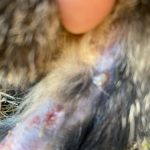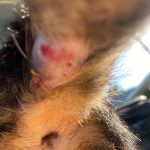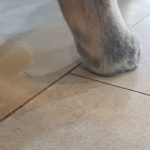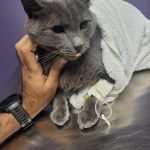Hello,
I avoid grain free. I don’t think there is likely any benefit to it while there is still a risk of heart issues. So I just don’t recommend it. Why worry about something that is avoidable?
My border collie 2 years old recently started staring at shadows. She will just sit and stare for hours. When the light moves and the shadow is in a different spot she will move with it. What could be going on? I can’t get her to play or cuddle or anything once she starts staring.
I took her to the vet for bloodwork and everything came back normal.
Comments
Hello! I was listening to a lecture on animal nutrition, and it brought up the topic of grain-free diets. I used to feed my dogs the blue wilderness grain free diet. But is grain free safe for my dog? Should my dogs have grain in their diet? They are currently eating team dog and that has grains in it. Thank you!
Comments
Hello, firstly thank you for making this site and sharing your message and trying to help both Vets and pet owners do better by and for their sake.
The cold weather in Oregon is setting in, I attached some photos I hope help. I’m trying to figure out the best way to identify and treat this issue.
The following are my observations of the marks located at the base of the tail areas side and underside only, surface level circular with some being slightly more crater like. Hair loss and area effects remain the same after what feels like over a month already. Plasma is typical puss in 2 or so spots, no swelling since first observed till present day, skin near effected area looks okay, over grooming of the area likely but not believing this is a source of pain. We live in a farm setting he is a stray I will watch over like my own and treat as such, I’m not against funding anything from big or small for his care but he’s strictly outdoor hunter and sometimes I wont see him for days. Would be most appreciative to any insight in what this might be or how I can help, likewise if there is a wound spray or dewormer I could purchase he is 100% outdoors and I see no signs of worms but he drinks from bird bath dishes. He will allow me to handle him but only so much I’d be much more worried when his patience runs out. I’d say he weighs about 15 pounds and overall health and appearance / dental is amazing. I always offer him a safe clean area and access to the property I will be buying a breakaway collar with a GPS tracker for him, he’s a farm cat my neighbor and me watch after. Would this be something to just give more time to mend? or should I step in and apply or seek help. Thank you! I will 100% be doing a donation, really wish more Vets were like you or highlighted in the community.
EDIT, the donation link via paypal says this is indelible, you can click 1-2 photos below that say Ads to be redirected to those to donate, if you have a place in mind please add it to the response I’d be happy to donate to your place of choice.
Comments
Hi Krista
My almost 11 year old MC Potcake (who has too many beings lipomas to count) recently had his senior blood work and urinalysis – everything was normal except an elevated ALP.
The urine was a free catch sample at 4 pm and it was very dilute. This prompted me to remember that he has been drinking a little more (summer) as well as eating a lot of watermelon – and to remind me that he has also had an increased appetite over the last year. I did a specific gravity on a morning urine sample after he had no access to water overnight and he was able to concentrate his urine at 1.025
He has chronic seasonal allergies so his inner thighs have a dark pigment change – this has been present for years – there are no other derm changes and I don’t see a pot bellied appearance but the vet is considering Cushing’s. They suggested an abdominal ultrasound first followed by a low dose suppression test. I would rather do the dex test first before an ultrasound. I’m not sure that I’m convinced that Cushing’s is likely but something may be going on.
Of more concern is that this previously healthy dog coincidentally, a few days after the blood work, had an episode of vertical nystagmus and ataxia – very brief – less than 30 seconds. He’s been fine ever since but its only been a few days – I have been told that vertical nystagmus is less common with Senior Vestibular disease and possibly more likely a central lesion.
any thoughts that you have would be appreciated !
Pam
Comments
Update: German Shepherd Diesel.
I would like to receive your advice regarding my German Shepherd, Diesel, who has developed a limp. His limp has gotten a little bit better, but sometimes he will limp very badly. I have limited his activity and made sure he isn’t putting any unnecessary stress on the foot. I’ve located the source of his discomfort, which is on his right rear ankle, and it is swollen. There’s no apparent injury to his paw, and I’m concerned it could be a sprain or even a fracture. He was running around in the house on porcelain tiles playing ball, and I noticed him limping on one of his runs. I’m unsure whether to proceed with an x-ray or to monitor his condition for a few more days. Your professional opinion on this matter would be greatly appreciated.
Thank you for your time and attention to Diesel’s situation.
Comments
I have two cats so I didn’t notice my cat is not eating. He’s very skinny. He refuses his favorite foods. He’s drinking water. He’s greenish looking poo around his anus. Old and dry. I tried to clean it.
We are on one income and cannot make it to the vet. What should I do?
Comments
A question for Krista Magnifico:
Hello! Hoping to get some advice on recommended next steps for my cat, Sammie, who is being evaluated for IBD vs. small cell lymphoma.
Sammie is 17 years old and is overall quite healthy! Throughout the time I’ve had her, she’s had a history of vomiting a ~once per week or two (sometimes more frequently). Vomit is usually clear, foamy. No other GI issues or health issues otherwise. She is active and energetic, and has not had any health issues until ~1 month ago when I noticed she stopped eating as much as she previously did. She stopped eating her dry food altogether, and seemed to become quite picky with her wet food. I initially thought her teeth may be bothering her because of the avoidance of dry food, so I brought her to the vet.
Vet found that she had lost a couple of pounds, unintentionally. Based on presenting symptoms, vet thought she might have a GI pathology so ordered an abdominal U/S:
Ultrasound, Abdominal Study Outcome:
Kidneys: overall normal size but mild reduction in detail and small mineral foci. Trace pylectasia noted w/out ureteral disension.
GI: Avg SI thickness normal. Mild corrugation is noted in some regions and some ileus (luminal fluid distension up to 4 mm w/ reduced
peristalsis) noted w/out obstruction. No discrete abnormalities appreciated throughout the small intestines.
Caudal abdominal nodes are prominent to mildly enlarged and rounded w/ smooth texture. One irregular cystic structure noted near right
kidney. The mesentery around the ileus segments is mildly hyperechoic.
A:
Intestines most consistent w/ enteritis
Nodes: r/o reactive vs other
Cystic strucure: r/o benign mesenteric vs inflamed node
Kidneys have evidence of chronic disease.
Here are her prior labs:
PRIOR LABS:
7/15/24: Wt loss 0.28 lb; PCV: 40/7.6; Chem18: BUN 41, creat 1.7, K+ 4.3, phos 4.2
U/A: USG 1.019, pH 6.0, rare wbc/rbc; no bact/cryst; cobalamin: 437; folate: 11.2
2/13/24: Wt loss 0.8 lb; CBCcomp: hct 44, diff wnl (clots in sample; rec. resubmit)
Chem25: BUN 40, creat 1.3; T4: 2.8; SDMA <10
U/A: USG 1.025, pH 6.0, rare wbc, no rbc/bact/cryst, rare fine gran casts.
1/19/23: Wt loss 0.4 lb; CBC: (hct 40, diff wnl); Chem25: (BUN 32, creat 1.3)
T4: 1.8; U/A: USG 1.051, pH 6.5, 1+ prot, rare wbc, no rbc/bact/cryst
11/19/21: CBC: (hct 46, diff wnl); Chem: (BUN 34, creat 1.5); T4. 1.9; DGGR lipase 9
U/A: USG 1.053, pH 7.5, rare amorph. crystals, no wbc, no rbc
6/17/22 Wt loss 0.16 (as desired); USG 1.040; SDMA: 11
Most recent A&P:
A:
1) Intestines most consistent w/ enteritis (IBD vs SCLSA); ileus likely cause of decreased appetite.
2) Nodes: r/o reactive vs other
3) Cystic strucure: r/o benign mesenteric vs inflamed node
4) Kidneys have evidence of chronic disease ; in keeping w/ previous lab findings.
P:
1) Rx: metoclopramide 5 mg: 1/4 tab po every 8-12 hrs.
2) Continue vit B12 as Rxed.
3) picked up Mirataz but hasn't started it yet. Rec. give. metoclopramide for 2-3 days and then if not improved appt, start Mirataz.
4) to consider presumptive pred tx vs ex-lap for biopsies.
Sammie is seeming to eat better with the metoclopramide.
My question:
Is pusuing an ex-lap for biopsy recommended vs. empiric tx for IBD with steroids vs. empiric tx for SCL with steroids + chlorambucil.
Thank you!!!
Comments
Post neutering my vet diagnosed a hernia and did a second surgery. They found that it was just a seroma. Now they are saying she has another seroma. She is a ragdoll and has a very saggy stomach and I can’t see a lump this time. I don’t believe it’s a seroma. They have told me to bring her in to have a drained. Is it negligent not to go to this appointment?
Comments
Hello
My name is Parham Parsa, I found your page on youtube and have read your blog, and for once I saw someone that is actually talking about blocked cats and is raising awareness to this issue and I wanted to thank you for it.
My cat Mercury (4.5 years old, 18lbs) is currently in the hospital for another urinary blockage and I genuinely don’t know what to do, this is his third visit, first time he got blocked was about a year and half ago and he was on the death’s door, his blood work was extremely elevated, he was lethargic and in visible pain. His regular vet unblocked him and transferred him to a vet hospital for further care, this visit cost me about $5K, and after that he was put on a strict urinary diet. Second time was 3 months ago where we noticed him being in pain and struggling once again and we took him to an ER vet and he was unblocked again, despite my persistence of leaving the his urinary catheter in, they took everything out, and send him home that very night, thankfully he remained unblocked until last night. His vet told me that since he is keep getting blocked he should just get the PU surgery and all but refuse to see him, so I took him to the Metropolitan vet hospital and their estimate for getting him unblocked and doing the PU surgery was 7-8 thousand dollars which is wildly out of reach for me at the moment. After reading your blog I have decided that if I find a second job I can afford to have him unblocked and kept in the hospital for observation for a night or two but I don’t know what I can do after that. If you have any suggestion regarding an affordable PU surgery or any other suggestion I am all ears. I’m really sorry for the long email, and looking forward to hearing back from you.
I just got off the phone with his vet at Metropolitan and after they took some X-Rays they saw some large stones in his bladder which they suspect could be the reason for his repeated blockages, and recommended a cystotomy and they said that the balance would stay at 7-8 thousand dollars. As of now my plan still remains to have him unblocked and watched for couple of days but I don’t know what I should do next.
PS.. I have attached a couple of pictures of him to this post. He is genuinely the sweetest and the friendliest cat I have ever met and the idea of me having to say goodbye to him just because I can’t pay for his treatment is is something I cannot imagine.
Comments
I have a very special and painful case I need help with, I have tried several different veterinarians with no diagnosis or prognosis so far. It may be a long shot, but I was hoping you could help me shine a light on this.
In April I found an extremely skinny stray cat and took him in. I first thought he was malnourished from lack of food for being in the streets, but 4 months in his case keeps unfolding.
He is likely older than 15 years old, but he’s a happy cat with a lot of energy and mobility. He weighs 3kg but he’s a big cat, you can feel every single bone in his spine, although you can’t see them that easily because he has long hair. He’s completely affectionate, loves to be pet, and asks very politely for attention and food all the time.
All we know about his past is he is neutered, he had some teeth surgically removed and he tested negative for FIV and FeLV.
He had a huge appetite when I first took him in, he would eat 100g of food in one meal and ask for more right after. He would sometimes ‘cough’, it sounded like he was choking on some kind of fluid, it doesn’t happen in sequences, but it happens almost every day until today.
He always drank LOTS of water and produced a lot of urine as well. His feces at the beginning were really solid with some mucus.
After a month, he continued to eat plenty and hadn’t gained any weight, that’s when he started to throw up. It started happening a few days a week, usually after spending several hours without eating he would throw up a clear frothy fluid with no content, and then it progressed to twice every day regardless of when he had eaten.
We suspected it could be diabetes or hyperthyroidism, but the labwork didn’t confirm either, it showed regular kidney function with small liver function alterations.
We then introduced prednisolone (2,5mg/day) and changed his diet from a mix of natural home-cooked protein, hypercaloric wet food, protein supplements, and dry food to exclusively Royal Canin Hypoallergenic while waiting for Royal Canin Gastrointestinal Hydrolyzed Protein to arrive in Brazil, keeping Omega 3 (fish oil) 500mg/a day in his diet.
Vomits went away for a while. He kept drinking lots of water and peeing a lot, but his feces got softer (not liquid).
He had periods where he lost his appetite, which we treated with mirtazapine, he reacted after 6 days.
We performed an ultrasound and discovered that basically all his internal organs were compromised. He has severe alterations everywhere. Still, the best specialists I could find couldn’t tell me what was causing it and offer a course of treatment that didn’t involve opening him up to collect tissues for a biopsy.
I personally think it is absurd that a doctor could look at this frail elderly cat who obviously can’t resist anesthesia without serious risks and say that surgery is the only way to go, all to find out for sure if we’re dealing with a lymphoma or an infection. I’m looking for someone to advise me on the most effective course of action. Of course, I aim to reverse his condition, but I understand that given his age and how advanced it is, it might not be an option.
He is currently at 3kg, eating exclusively Royal Canin Gastrointestinal Hydrolyzed Protein with fish oil, and taking prednisolone every day for a month now. His appetite is healthy, he still drinks a lot, pees a lot, and poops regularly but softer. He eats an average of 5 small meals.
Vomits are back down to a few times a week, usually early in the morning before his first meal, and always a clear liquid. He goes and eats right after throwing up so I get the impression he is not nauseous.
He doesn’t seem to be in pain overall.
He’s not gaining any weight regardless of all my efforts.
That is why I’m giving this a shot and trying to get your attention. I hope you have more resources and knowledge that could help me figure out appropriate next steps to give this little guy the best fighting chances I can.
On this link you’ll find a translation of his bloodwork and ultrasound. I had chat GPT translate it for me so forgive me if there are errors.
Link: https://docs.google.com/document/d/1yqcen-TYzyvfBYU-J4t1tCHola1E2otDGDa1H7V032Y
I appreciate any support you can lend me, his name is Valentim which means brave and strong, and I want him to win this fight.

























This sounds like an obsessive behavior. I would be working on training and mental work daily in the hopes this can be curbed.
Hello,
I would also ask your vet about the possibility of focal seizures and whether a referral to a neurologist might be helpful.